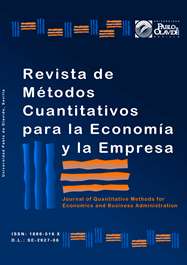Impacto a corto plazo del COVID-19 en el sistema financiero en una economía dolarizada
DOI:
https://doi.org/10.46661/revmetodoscuanteconempresa.5556Palabras clave:
COVID-19, Bloqueo, sistema financiero, regresión discontinua, EcuadorResumen
Este trabajo analiza el impacto a corto plazo de las políticas de bloqueo implementadas para frenar la propagación del COVID-19 en el sistema financiero ecuatoriano. Se utiliza un diseño de regresión discontinua en el tiempo (RDiT) junto con datos oficiales. Los resultados muestran una disminución generalizada de los depósitos totales (-3.4%) así como de los créditos dirigidos al sector privado (-0.60%). Además, se encuentran resultados heterogéneos entre los diferentes tipos de créditos y depósitos siendo los más afectados los relacionados con las instituciones públicas.
Descargas
Citas
Albulescu, C.T. (2021). Covid-19 and the United States financial markets’ volatility. Finance Research Letters, 38, 101699. https://doi.org/10.1016/j.frl.2020.101699
Anderson, M. L. (2014). Subways, strikes, and slowdowns: The impacts of public transit on traffic congestion. American Economic Review, 104(9), 276-396. https://doi.org/10.1257/aer.104.9.2763
Atalan, A. (2020). Is the lockdown important to prevent the covid-19 pandemic? Effects on psychology, environment and economy-perspective. Annals of Medicine and Surgery, 56, 38-42. https://doi.org/10.1016/j.amsu.2020.06.010
Auffhammer, M., & Kellogg, R. (2011). Clearing the air? The effects of gasoline content regulation on air quality. American Economic Review, 101(6), 2687-2722. https://doi.org/10.1257/aer.101.6.2687
Barnes, S. R., Beland, L.-P., Huh, J., & Kim, D. (2020). The effect of covid-19 lockdown on mobility and traffic accidents: Evidence from Louisiana (Working paper). GLO Discussion Paper. Retrieved from https://www.econstor.eu/handle/10419/222470
Bastos, R., & Pindado, J. (2013). Trade credit during a financial crisis: A panel data analysis. Journal of Business Research, 66(5), 614-620. https://doi.org/10.1016/j.jbusres.2012.03.015
Beck, T. (2020). Finance in the times of coronavirus. Economics in the Time of COVID-19, 73-76.
Camino-Mogro, S. (2020). Turbulence in startups: Effect of covid-19 lockdown on creation of new firms and its capital (Working Paper). Retrieved from https://mpra.ub.uni-muenchen.de/ 104502/1/MPRA paper 104502.pdf
Cattaneo, M., Idrobo, N., & Titiunik, R. (2020). A Practical Introduction to Regression Discontinuity Designs: Foundations (Elements in Quantitative and Computational Methods for the Social Sciences). Cambridge: Cambridge University Press. https://doi.org/10.1017/9781108684606
Dang, H.-A., & Trinh, T.-A. (2021). Does the covid-19 lockdown improve global air quality? New cross-national evidence on its unintended consequences. Journal of Environmental Economics and Management, 105, 102401. https://doi.org/10.1016/j.jeem.2020.102401
Engelhardt, N., Krause, M., Neukirchen, D., & Posch, P. (2020). What drives stocks during the corona-crash? News attention vs. rational expectation. Sustainability, 12 (12), 5014. https://doi.org/2071-1050/12/12/5014
Giese, J., & Haldane, A. (2020). Covid-19 and the financial system: a tale of two crises. Oxford Review of Economic Policy, 36(1), S200-S214. https://doi.org/10.1093/oxrep/graa035
Gong, D., Jiang, T., & Lu, L. (2021). Pandemic and bank lending: Evidence from the 2009 H1N1 pandemic. Finance Research Letters, 39, 101627. https://doi.org/10.1016/j.frl.2020.101627
Goodell, J. W. (2020). Covid-19 and finance: Agendas for future research. Finance Research Letters, 35, 101512. https://doi.org/10.1016/j.frl.2020.101512
Imbens, G. W., & Lemieux, T. (2008). Regression discontinuity designs: A guide to practice. Journal of Econometrics, 142(2), 615-635. https://doi.org/10.1016/j.jeconom.2007.05.001
Kremp, E., & Sevestre, P. (2013). Did the crisis induce credit rationing for french smes? Journal of Banking & Finance, 37(10), 3757-3772. https://doi.org/10.1016/j.jbankfin.2013.05.028
Lagoarde-Segot, T., & Leoni, P. L. (2013). Pandemics of the poor and banking stability. Journal of Banking & Finance, 37(11), 4574-4583. https://doi.org/10.1016/j.jbankfin.2013.04.004
Leoni, P. L. (2013). Hiv/aids and banking stability in developing countries. Bulletin of Economic Research, 65(3), 225-237. https://doi.org/10.1111/j.1467-8586.2011.00401.x
Li, L., Strahan, P.E., & Zhang, S. (2020). Banks as lenders of first resort: Evidence from the covid-19 crisis. The Review of Corporate Finance Studies, 9(3), 472-500. https://doi.org/10.1093/rcfs/cfaa009
Sarkis, J. (2020). Supply chain sustainability: learning from the covid-19 pandemic. International Journal of Operations & Production Management, 41(1), 63-73. https://doi.org/10.1108/IJOPM-08-2020-0568
Zaremba, A., Kizys, R., Aharon, D.Y., & Demir, E. (2020). Infected markets: Novel coronavirus, government interventions and stock return volatility around the globe. Finance Research Letters, 35, 101597. https://doi.org/10.1016/j.frl.2020.101597
Zhang, D., Hu, M., & Ji, Q. (2020). Financial markets under the global pandemic of covid-19. Finance Research Letters, 36, 101528. https://doi.org/10.1016/j.frl.2020.101528
Publicado
Cómo citar
Número
Sección
Licencia

Esta obra está bajo una licencia internacional Creative Commons Atribución-CompartirIgual 4.0.
El envío de un manuscrito a la Revista supone que el trabajo no ha sido publicado anteriormente (excepto en la forma de un abstract o como parte de una tesis), que no está bajo consideración para su publicación en ninguna otra revista o editorial y que, en caso de aceptación, los autores están conforme con la transferencia automática del copyright a la Revista para su publicación y difusión. Los autores retendrán los derechos de autor para usar y compartir su artículo con un uso personal, institucional o con fines docentes; igualmente retiene los derechos de patente, de marca registrada (en caso de que sean aplicables) o derechos morales de autor (incluyendo los datos de investigación).
Los artículos publicados en la Revista están sujetos a la licencia Creative Commons CC-BY-SA de tipo Reconocimiento-CompartirIgual. Se permite el uso comercial de la obra, reconociendo su autoría, y de las posibles obras derivadas, la distribución de las cuales se debe hacer con una licencia igual a la que regula la obra original.
Hasta el volumen 21 se ha estado empleando la versión de licencia CC-BY-SA 3.0 ES y se ha comenzado a usar la versión CC-BY-SA 4.0 desde el volumen 22.






